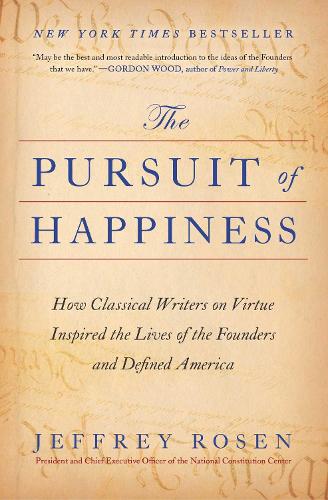
The Pursuit of Happiness: How Classical Writers on Virtue Inspired the Lives of the Founders and Defined America
(Paperback)
Publishing Details
The Pursuit of Happiness: How Classical Writers on Virtue Inspired the Lives of the Founders and Defined America
By (Author) Jeffrey Rosen
Simon & Schuster
Simon & Schuster
16th September 2025
United States
Classifications
General
Non Fiction
General and world history
Biography: historical, political and military
973.31
Physical Properties
Paperback
368
Width 140mm, Height 213mm, Spine 23mm
310g
Description
A New York Times bestseller and an enrichingbrilliant (David W. Blight, Pulitzer Prizewinning author of Frederick Douglass) examination of what the pursuit of happiness meant to our nations Founders and how that famous phrase defined their lives and became the foundation of our democracy.
The Declaration of Independence identified the pursuit of happiness as one of our unalienable rights, along with life and liberty. Jeffrey Rosen, the president of the National Constitution Center, profiles six of the most influential foundersBenjamin Franklin, George Washington, John Adams, Thomas Jefferson, James Madison, and Alexander Hamiltonto show what pursuing happiness meant in their lives, and to give us the best and most readable introduction to the ideas of the Founders that we have (Gordon Wood, author of Power and Liberty).
By reading the classical Greek and Roman moral philosophers who inspired the Founders, Rosen shows us how they understood the pursuit of happiness as a quest for being good, not feeling goodthe pursuit of lifelong virtue, not short-term pleasure. Among those virtues were the habits of industry, temperance, moderation, and sincerity, which the Founders viewed as part of a daily struggle for self-improvement, character development, and calm self-mastery. They believed that political self-government required personal self-government. For all six Founders, the pursuit of virtue was incompatible with enslavement of African Americans, although the Virginians betrayed their own principles.
Immensely readable and thoughtful (Ken Burns), The Pursuit of Happiness is more than an elucidation of the Declarations famous phrase; it is a revelatory journey into the minds of the Founders, and a deep, rich, and fresh understanding of the foundation of our democracy.
Reviews
"With insight and wit, legal scholar Rosen shows how classical philosophy inspired the Founders. . . . Rosen's noteworthy book offers a better understanding of philosophy and American history." * Booklist *
"[A] fast-paced romp through early American political thought. . . . An entertaining window on the American founders reading lives." * Publishers Weekly *
"A study of the Founding Fathers search for self-mastery. . . . In their distinguishing between being good from feeling good, the founders, Rosen hopes, may inspire readers to redefine the meaning of a good life.A thoughtful rendering of Americas history." * Kirkus Reviews *
Jeffrey Rosen found a gap in his education, such as we all have. In filling it he has written a masterpiece of intellectual historyabout the Founders, renewing, we can hope,our reading of them and what theyread. Here is the enriching story of how pursuit of happiness never meant pleasure or success, but the self-governing quest, always unachieved, of virtue. This brilliant work is very new about very old ideas thatrefresh thespirit. -- David W. Blight, Yale University, author ofFrederick Douglass: Prophet of Freedom
To understand who we are, we must begin at the beginningwhich is precisely what Jeffrey Rosen does in this remarkable and timely book. By exploring how the American Founders viewed virtue and the fabled (and often misunderstood) pursuit of happiness, Rosen offers us a much-needed reminder of the centrality of civic and personal virtue. -- Jon Meacham, author ofAnd There Was Light: Abraham Lincoln and the American Struggle
Using the classical virtues prescribed by Benjamin Franklin as a way of organizing his book, Jeffrey Rosen has put together a remarkable collection of fresh and insightful essays on the Founders. Indeed, his book may be the best and most readable introduction to the ideas of the Founders that we have. -- Gordon Wood, author ofPower and Liberty: Constitutionalism in the American Revolution
A delightful, insightful reminder of a truth obvious to the Founders but forgotten by subsequent generations of Americans: that personal happiness and the health of the republic depend on virtue, which in turn requires regular cultivation. Read this timely book for your own benefit and the good of us all. -- H.W. Brands, author ofFounding Partisans: Hamilton, Madison, Jefferson, Adams and the Brawling Birth of American Politics
Jeffrey Rosens immensely readable and thoughtful book on Americas founders makes a strong case that a life invested in understanding the past may in fact be a happier one. There are lessons here for preserving our democracy today. -- Ken Burns, Emmy Award-winning filmmaker ofThe American Revolution
"The Founders had no internet to educate them, but they did have advice books, contemporary and ancient. Jeffrey Rosen guides us through them to see what the Founders meant by happiness, and how they hoped to secure it. And, he suggests, we could do the same today." -- Richard Brookhiser, author ofGive Me Liberty: A History of America's Exceptional Idea
Author Bio
Jeffrey Rosen is President and CEO of the National Constitution Center, where he hostsWe the People, a weekly podcast of constitutional debate. He is also a professor of law at the George Washington University Law School and a contributing editor atThe Atlantic. Rosen is a graduate of Harvard College, Oxford University, and Yale Law School. He is the author of ninebooks, including theNew York Timesbestsellers The Pursuit of Happiness: How Classical Writers on Virtue Inspired the Lives of the Founders and Defined America and Conversations with RBG:Justice Ruth Bader Ginsburg on Life, Love, Liberty, and Law. His essays and commentaries have appeared inThe New York Times Magazine;on NPR; inTheNew Republic, where he was the legal affairs editor; and inThe New Yorker,where he has been a staff writer.
